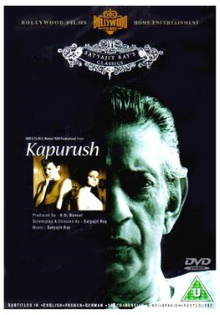Here is another film by Satyajit Ray who is of course the great director of the masterpiece The Music Room. This one is a short film that is much smaller in scope, being in effect an in-depth psychological study of its main character. It is nowhere as impressive being so much less ambitious but it remains a competently made film about a very specific human failing.
Amitabha Roy is a scriptwriter who is passing through a rural town when his transport breaks down and he is forced to spend the night there. A local, Bimal Gupta, who runs a tea plantation, invites him to be his guest, explaining that he would welcome the company as there is little of interest in the small town. When they arrive, Gupta introduces his wife Karuna and Amitabha is shocked to recognize her as his old girlfriend. Neither he nor Karuna say anything about their previous relationship. Karuna remains unfailingly polite while Gupta proves to be amiable and enthusiastic host, regaling Amitabha with stories about the countryside. Amitabha however is wracked by guilt and regret as he and Karuna were at one point on the verge of getting married. But at the time, he was young and uncertain of his future and so let Karuna down. Since then, he has never fallen in love again.
This is a small film in all senses of the word. There are really only the three characters, a few simple locations and it takes place over the course of a night and the following day, with flashbacks to Amitabha and Karuna’s relationship. Yet there is competence behind this simplicity and a constant sense of tension once Amitabha realizes who Gupta’s wife is. The conversations are about seemingly mundane topics but never fail to hold your interest as Amitabha tries to work out whether Gupta is a good husband and whether Karuna is really happy where she is. It’s even possible to learn a bit about the local situation. As Gupta explains, he has no peers as a plantation manager as all those around him are his staff and so are of a lower social class so he cannot socialize with them. It’s nothing as richly developed as the background in The Music Room but it is something especially as both Amitabha and Gupta are educated city men who would ordinarily not be in favor of this kind of feudalism.
But the real point of this film is as an in-depth psychological portrait of Amitabha as a man who lacks a spine, the coward of the film’s title. Not only did he hesitate to commit to their relationship when pressed by Karuna, but that failure haunts him to the present day. What the director wants to capture here is that this defining moment of Amitabha’s life matters only to him but Karuna herself has long moved past it. In particular, Gupta could actually make for a decent friend for Amitabha but he is only able to see the worst of Gupta in everything due to his personal history. This is of course a common human failing that we are all familiar with, dwelling on our regrets and mistakes long past the point where everyone else has forgotten about it.
Still, while this film does succinctly and competently capture this one particular aspect of human psychology, it does seem too small a subject to merit an entire film. At least it’s short enough not to overstay its welcome and it is interesting to get another look at the India of that era, surprisingly similar in many ways to us here in Malaysia.
